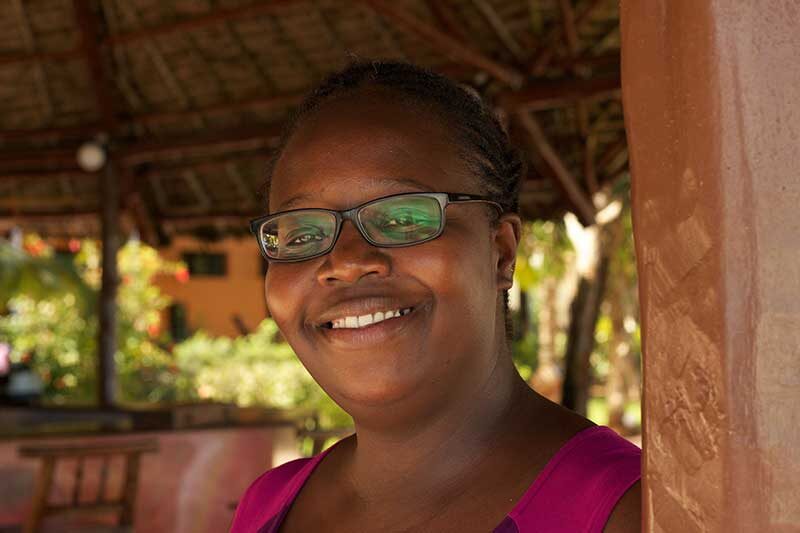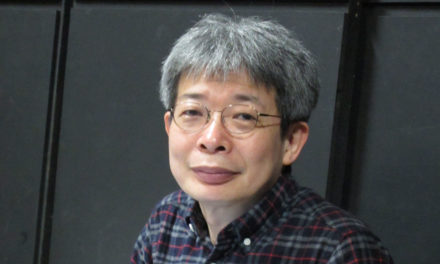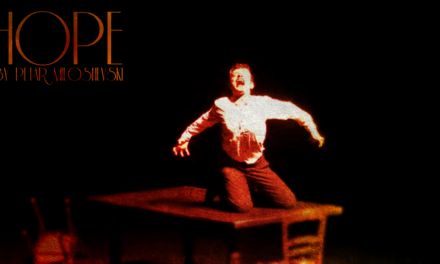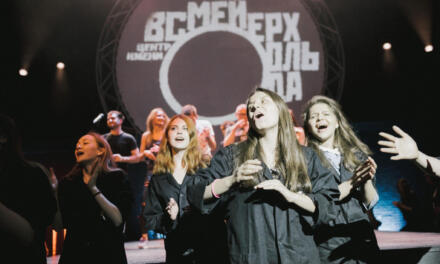Angella Emurwon is a playwright, theatre director and filmmaker. The name ‘Emurwon’ means seer, and Angella is already doing that in Ugandan theatre. I interviewed her to learn about her work, inspiration and process.
The interview was by an email sent via a mobile phone from a wobbly taxi (matatu) bound for Nansana, a Ugandan town, on a somewhat muggy March afternoon. The email winged its way into Tororo, another Ugandan town with an imposing rock, a serenity of rustling trees and cocktail of singing birds. Here, in the living room of an old bungalow, Emurwon sits; door open to one side, back to the window, facing a blank wall for fear of staring outside and dreaming her day away. She writes to complete the interview.
Q: Angella Emurwon, award-winning playwright… it’s a pleasure to have you for this interview…
A: I’m honored. Thank you for thinking of me.
Q: Mmm… you have a ‘bubbling’ personality. And I really wonder if you ever get annoyed. What keeps you going? And, by the way, how different is Angella Emurwon the girl growing up in Uganda and Kenya from the artist we know today?
A: Hahaha … yes, I do have a bubbly personality. I love life and I love people and I love being out and about in the world. But make no mistake, I do get annoyed, just like everyone else (Serious emoji).
How different is Angella, now, from the little girl growing up in Kenya and Uganda? …. mmhh … I am much more comfortable with who I am and who I am becoming. And even though I am still shy and somewhat timid, it is in a less obvious way.
Thankfully, I now see the value of growing up an outsider and not quite fitting in, anywhere. This made me a keen observer of people and situations and pretty adept at fading into the background depending on the situation. I am not always successful but there are lessons in the attempt (smiley emoji).
It helps me see beyond what people say, what they do, and hopefully, my work benefits from that.
Q: You’re a two-time award winner of the prestigious BBC Radio Playwriting Competition. Your play, The Cow Needs a Wife took third place in 2010. You went ahead to win the 2012 competition in the English-as-a-second-language category with your Sunflowers Behind a Dirty Fence. What’s your inspiration, your secret for radio playwriting? How does audio theatre speak to you?
A: I enjoyed radio programs as a child. There were dramatizations of novels and stage plays. Eventually, I was listening to radio plays. Radio is a medium I enjoy.
Radio plays are wonderful. They transport you to amazing and incredible places using sound and sound effects, as well as your own imagination.
I often tell my playwriting mentees to imagine they were telling someone a story in the dark – your audience can hear you, but they can’t see your face or know what your body is doing – what additional information (what sound) would you then give your audience so that the story comes alive for them?
Q: I must confess, listening to Yakobo and Tonnie in Sunflowers Behind a Dirty Fence reeks of a clever observation on the world of children. What makes it easy for you to create credible child characters?
A: I would never say easy. Writing is never easy. It is great and joyous and nerve-wracking and rewarding and anti-climactic and All of it! But easy? Oh no.
I will be honest with you, I approach children, in life, and in writing, as people – with their own thoughts, dreams, fears; desires, that are valuable and important to them. Their concerns may seem ‘frivolous’ ‘imaginary’ ‘basic’ to an adult, but it means the world to them. That’s where you find intention.
When it comes to dialogue, I find that children are more direct and less ambiguous when they communicate, whether they are telling you the truth or selling you some story. So, I try and use that.
Q: How and when do you find your writing muse? Any special process you undergo?
A: My muse. Wow! I would have given you a wonderfully poetic answer a couple of years ago. But right now, I’m very much in the discipline and consistency phase of work as a writer.
I still spend a lot of time turning an idea over and over in my mind. I will write snippets of scenes or feelings or images in my notebook. I’ll find a song that captures the essence or mood of one of my characters. I watch people, a lot. But practicing discipline and writing regularly, that’s where I am right now.
Q: Your artistic repertoire includes directing for the stage. Plays like Macbeth and A Ghost’s Story come to mind here. Tell us about your directorial choices, motivation and vision.
A: Writing for me is like breathing. It is my favorite and the best way – I think – that I communicate. But writing is quite solitary, and while I enjoy it, it can get a little too much in my head.
When I discovered directing, it was the best antidote to add vibrant and meaningful creative exchange to my work. I love working with people I admire, learning from them, being impacted by their world and work. I also enjoy putting different elements together to create a meaningful and cohesive whole. I love directing: both theatre and film. I love it!
My directing intention is to engage my audience intellectually and emotionally with the hope of completely immersing them in the story until they can’t help but respond. My desire is to create moments of energy exchange throughout the process – from writing, to rehearsal, to production or screening.
Q: From radio dramas to theatre — Strings (2017), your stage play, had a good reception — and now you’re into film. Why the shift from one form to another, and doesn’t this affect your creative output in one form, say theatre?
A: I am a storyteller. And I free myself to tell stories in whatever form the story wishes to live in the world. I wish I had the time to dance or cook or sing or draw, at a professional level. I am interested in lots of different things.
Which brings me to the second part of your question, varied interests do lessen my output. I mean, I’ve had a stage play rattling in my brain for 5 – 6 years! I think if I had a quiet 3 months, I could probably get it out. But my mentoring work, my filmmaking work, my bread and butter work, are top priority at the moment. I also believe there are times and seasons for the different things in my life, and at the moment, filmmaking is holding the center.
Q: What’s the current state of women in the arts – particularly theatre? What opportunities, or even challenges, do female theatre practitioners in Africa have that their counterparts elsewhere don’t face and vice versa?
A: That’s so huge a question that I don’t think that I am in any way qualified to answer. Women Artists, Women Theatre Artists, defy any type of homogenous grouping or generalization: they are numerous, diverse, multifaceted, and often multidisciplinary, even amongst my small group of friends.
And to even try to talk meaningfully and knowledgeably about Theatre on the continent? That’s crazy! I can maybe talk about theatre in Uganda, and even then, with total humility.
That said, Theatre in Uganda is very exciting. We have fantastic opportunities for Theatre-makers with spaces like the Kampala International Theatre Festival, and programs like Tebere Foundation’s Emerging Playwright Labs and Mid-Career Playwright Residencies; and Silent Voices Uganda’s Theatre Directing Residencies. All programs helmed by Women, by the way. And while these programs are based in Uganda, they serve and have made an impact in East Africa and beyond.
I have personally benefited a great deal from participating in Kampala International Theatre Festival, and Tebere Foundation’s programs. I have developed as a playwright, a stage director, and as a mentor for fellow artists.
What every artist wants, no matter their gender, is opportunity, space and support. Not only to make and present work but also to interrogate their process and push the limits of who they are and can be, as artists with something to contribute to our immediate and global community.
We desire the freedom to try, to fly, to fail … AND the opportunity to do it all over again — without every output being valued by comparisons to other artists or according to the western world’s ideology or worldview, or opportunities and space accorded solely by commercial viability.
There is value in being the soul, the truthtellers, the seers, the praise-singers, in all the ways that this presents, to ourselves and our communities. Women deserve this same respect and consideration.
Q: Can you talk about the future of theatre on the continent?
A: There has always been theatre on the continent. There will always be theatre on the continent. The structures and forms may change, but I believe storytelling in Community (which is what theatre is) will prevail.
Q: What theatre performance or show — could be one you directed or wish you had directed — have you lived to remember?
A: It is hard to pick. I could tell you stories for days of theatre performances that have moved me and changed me.
But rather than wishing I had directed the play, perhaps I’d say, I wished I had been at the rehearsals (another smiley emoji) of a Burundian play called Liebe, written and directed by Marshall Mpinga Rugano, that played at 2017 Kampala International Theatre Festival. The performances were visceral and riveting. At some point, I stopped reading the subtitles and just lived in the play with the characters, and just listened, experienced their story. Even now, I can see the main narration actor’s toes gripping the edge of the stage because she could not contain her own retelling of an incident that was being reenacted behind her. The performers, each and everyone, charged up the room. They told us their story.
Q: Tell us about the Angella Emurwon we don’t know. How’s she like? What things does she like or do that we don’t know? Is there, ahem, a Mr. Angel somewhere in this Angella’s life?
A: Hahaha … what a question!
Angella Emurwon is an open book, for the most part (broad smiley emoji).
A tad reclusive, but I usually won’t say no to a couple of drinks and a whole lot of dancing.
Mr. Angel, nope. Not yet. I blame the reclusive nonsense that supposedly keeps me sane (chuckling emoji).
Q: If you were to meet a character(s) from a play, who would they be? What would you tell them?
A: What a question! There are so many to choose from.
But right now, in this moment, I would want to meet Patrice Lumumba in Aimẻ Cẻsaire’s A Season in the Congo. I am fascinated by that period in history, the Pan-African movement, the idealism, but also the very flawed heroes of the movement. I would want to know, knowing what we know now, how should our new ‘heroes’ prepare, pursue, build? It is a naïve question as we continue to grapple with colonialism’s bitter aftermath.
Q: Any last word?
A: I am excited about the future as a theatre artist and storyteller.
I am longing for a time when Art in Uganda and Art on the Continent will be joyfully, thoughtfully, and completely resourced from within our communities, on the continent and in the diaspora.
When her final email came in, I saw slices of the Emurwon I know in the interview. By the way, she told me she is now writing a one-woman memory play titled PAYERA that she hopes to complete later this year. Plus, the play spans eighty years. Now that is something worth the wait! We shall be the first to let you know when it is out.
This article appeared in African Theatre Magazine on May 8, 2020, and has been reposted with permission.
This post was written by the author in their personal capacity.The opinions expressed in this article are the author’s own and do not reflect the view of The Theatre Times, their staff or collaborators.
This post was written by Ian Kiyingi Muddu.
The views expressed here belong to the author and do not necessarily reflect our views and opinions.


















